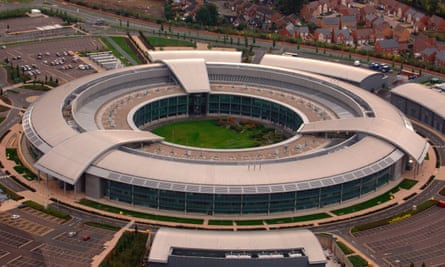Retaining data from telephone calls and emails is legal only if law enforcement agencies use it to tackle serious crime, the EU’s highest court has indicated.
The preliminary finding by the advocate general of the European court of justice (ECJ) in Luxembourg came in response to a legal challenge that was brought initially by David Davis, when he was a backbench Conservative, and Tom Watson, Labour’s deputy leader, over the legality of GCHQ’s bulk interception of call records and online messages.
Davis, one of the most vociferous critics of the state’s powers to collect data on its citizens, quietly withdrew from the case after his appointment to the cabinet. Many had commented on his involvement in the case at the EU’s highest court after he was appointed secretary of state for leaving the EU.
In an opinion likely to be followed by the full court, the advocate general, Henrik Saugmandsgaard Øe, clarified EU law after the two MPs successfully argued in British courts that the Data Retention and Investigatory Powers Act (Dripa) 2014 was illegal.
The ECJ’s advocate general said: “Solely the fight against serious crime is an objective in the general interest that is capable of justifying a general obligation to retain data, whereas combating ordinary offences and the smooth conduct of proceedings other than criminal proceedings … are not.” Only the data associated with calls and emails is retained, not the content of messages.
The preliminary ruling appears to bring European data retention practices closer into line with the debate over the passage of the UK’s investigatory powers bill, nicknamed the snooper’s charter, over what safeguards should be imposed for bulk interception and retention of data.
The court’s final decision will be delivered in the coming months. The vast majority of judgments follow the line set out by the advocate general.
Welcoming the finding, Watson said: “This legal opinion shows the prime minister was wrong to pass legislation when she was home secretary that allows the state to access huge amounts of personal data without evidence of criminality or wrongdoing.
“Labour has already secured important concessions, but I hope the government she leads will now revisit it. The opinion makes it clear that information including browsing history and phone data should not be made available to the security services and other state bodies without independent authorisation. The security services have an important job to do, but judicial oversight is vital if we are to maintain the right balance between civil liberties and state power.”
Davis and Watson, who were supported by Liberty, the Law Society, the Open Rights Group and Privacy International, had already won a high court victory on the issue, but the government appealed and the case was referred to the ECJ.

Caroline Wilson Palow, a lawyer with Privacy International, said: “Today’s opinion … is a serious blow to the UK’s investigatory powers bill [IPBill]. It hopefully presages a strong judgment from the court itself.
“The bulk powers – what we would call mass surveillance powers – embedded throughout the IPBill go far beyond tackling serious crime. They would give a range of public bodies, not just the police and intelligence agencies, the power to access the personal data of innocent people, often without any form of warrant.
“The advocate general’s opinion supports our calls for much stricter safeguards and oversight to protect us from serious violations of our privacy – including that all access to our data, including communications data, must be authorised by an independent authority such as a judge.”
James Welch, the legal director for Liberty, said: “The investigatory powers bill – the much-trumpeted legacy of our new prime minister’s time at the Home Office – goes much further than the law condemned today.
“This ‘snooper’s charter’ will vastly expand blanket data-gathering powers while failing to provide even the basic safeguards outlined by the advocate general. Dozens of public bodies will be able to grant themselves access to our most revealing personal data, including our web browsing histories, with no need for suspicion of criminality. Today’s opinion is a clear message to our blinkered government – your proposed new law breaches our human rights.”
The Green party peer Jenny Jones said: “Today’s European court of justice ruling, that bulk data collection is only lawful if it is used to tackle serious crime, makes it clearer than ever that the investigatory powers bill currently passing through the House of Lords is simply not fit for purpose.
“The bill poses serious risks to our civil liberties, sanctioning unprecedented surveillance of citizens’ communications and failing to put in place sufficient safeguards against the misuse of powers granted to the security services.”
The executive director of Open Rights Group, Jim Killock, said: “The advocate general has stated that data retention should only be used in the fight against serious crime, yet in the UK there are more than half a million requests for communications data each year. These do not only come from police but also local councils and government departments. It is difficult to see how the government can claim that these organisations are investigating serious crimes.”
At issue was whether there are EU standards on data retention that need to be respected by member states in their domestic legislation. The result, though significant in the short term, may eventually prove academic once the UK has withdrawn from the EU and the ECJ no longer has judicial authority over the UK.
Before he became a minister under Theresa May, Davis travelled to Luxembourg this spring to hear the case at the ECJ. He has argued that the British government is “treating the entire nation as suspects” by ignoring safeguards on retaining and accessing personal communications data.
The outcome of the Dripa case, which was heard by 15 European judges, is likely to have a significant impact on the ultimate shape of the controversial investigatory powers bill now before parliament.
The case has been heard amid successive atrocities in Paris, Brussels and Nice that have reinforced political demands for the expansion of powers to intercept emails and phone calls to help catch Islamic State militants operating on the continent.
During the Luxembourg hearing, lawyers for the UK government maintained that intercepted communications had been at the heart of every terrorist case investigated by police and the security services in recent years.











Comments (…)
Sign in or create your Guardian account to join the discussion